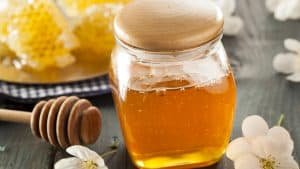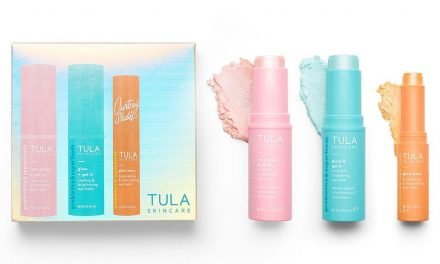
I believe that it’s always better to get nutrients from the food that we eat rather than from supplements.
Naturally, when I recently heard that honey, specifically raw (or natural) honey, offered health benefits ranging from boosting the immune system to protecting the cardiovascular health, I was intrigued.
I immediately started researching all sorts of information pertaining to honey and its benefits. What I found convinced me that perhaps raw honey needs to be in my medicine cabinet and not just my kitchen!
Probiotics and Prebiotics
Some time ago, I shared with you how important it is to protect your digestive system if you’re taking antibiotics. One way to do this is to ensure you are eating enough foods with the “good bacteria,” also known as probiotics, your gut needs to be healthy.
In addition to supporting our digestive systems, probiotics also help with constipation, mental sharpness, diarrhea, anxiety and depression, as well as keeping our immune system strong, among other benefits. These are all issues that concern especially boomers rather than younger people.
The thing about probiotics, however, is that they are pretty picky with what they need to eat to stay healthy while they do their job of keeping us healthy. And what they need are prebiotics, which come in the form of fiber.
Prebiotic foods are not digested by human enzymes, but reach the large intestines intact. They are a food source for good bacteria such as bifidobacteria and lactobacilli.
However, while all prebiotics are fiber, not all fiber is considered prebiotic. For a food item to be considered prebiotic, there are a few criteria it must meet.
These include resistance to gastric acidity, an ability to be fermented by the probiotics in your gut, and stimulation of the growth and/or activity of the intestinal bacteria associated with health and well-being.
This is where raw honey comes in. As it turns out, raw honey is an excellent prebiotic! It contains compounds called oligosaccharides which are not digestible in the small intestines. They reach the large intestine where the good bacteria utilize them to make nutrients that we can use.
Another thing that makes raw honey special is that it is a non-dairy probiotic product. This is a huge advantage if you are lactose intolerant or allergic to dairy products. Since dairy products are the ones that typically have probiotic/prebiotic properties, raw honey is an excellent alternative source for prebiotics.
Still, raw honey seems to primarily increase the growth of only certain strands of bacteria – bifidobacteria and lactobacilli, to be specific. So you may want to complement it with other fiber and plant food sources that are known to be good prebiotics, like bananas, onions, garlic, acacia gum, artichokes and whole grains.
Heart Health and Wound Healing
As boomers, we’re very aware of the importance of good cardiovascular health, and we’re always on the lookout for things we could and should be doing to keep our cardiovascular systems healthy. Raw honey contains powerful antioxidants, such as phenolic compounds, that are reported to reduce blood pressure and the risk of heart disease.
Some studies have also shown that eating natural (raw) honey can reduce your total cholesterol, which can also contribute to good cardiovascular health. To maximize this benefit of honey, make sure to continue eating other heart-healthy foods such as whole-grains and fresh fruit and vegetables.
Honey also has antimicrobial properties which make it a great ointment for treating wounds and common skin problems such as burns, dermatitis and eczema. Research has also shown that honey can hasten wound healing.
This is not surprising since, according to the National Institute for Health (NIH), “the healing property of honey is due to the fact that it offers antibacterial activity, maintains a moist wound condition, and its high viscosity helps to provide a protective barrier to prevent infection.”
The NIH also reports that honey has an inhibitory effect to around 60 species of bacteria.
Other Honey Benefits
Believe it or not, recent studies indicate that raw honey can also help with weight management since it may increase appetite-regulating hormones. There is also evidence that replacing sugar with raw honey may help prevent weight gain and even lower blood sugar levels.
Raw honey may be a great sweetener alternative for diabetics. Just be sure to use it in moderation, and talk with your doctor about how you can incorporate raw honey into your diet.
While the research is inconclusive on all the various benefits of raw honey, some studies indicate that it may delay the development of certain cancers. According to the NIH, raw honey induces apoptosis (cell death) in various types of cancer cells, and its anti-tumor effect may be attributed to its antioxidant properties.
Certainly, more research needs to be undergone, but scientists believe that honey potentially inhibits the development of cancer by blocking the three main stages of carcinogenesis: initiation, proliferation and progression.
If you are considering adding honey to your cancer prevention or cancer treatment regimens, talk with your healthcare provider or oncologist to see if there may be some benefit for you.
Where to Get It?
When you go shopping for honey, be sure to look for the raw or natural variety. Most honey that you will find on your supermarket shelves is processed and heated, which significantly reduces the nutrient content.
Raw honey is thicker in appearance and contains bee pollen (an antioxidant). You can also usually find raw honey at certain natural foods stores and at local farms specializing in raw honey. Check the National Honey Board locator to find a local, raw honey vendor near you.
Let’s Have a Conversation:
Do you routinely use honey as part of your health regimen, or do you use it mostly for cooking and food preparation? Do you usually buy raw or natural honey, or the more processed, store-shelved varieties? Were you aware of the health benefits of honey, or did you see it mostly as a sweetener or syrup? Please join the conversation below.





